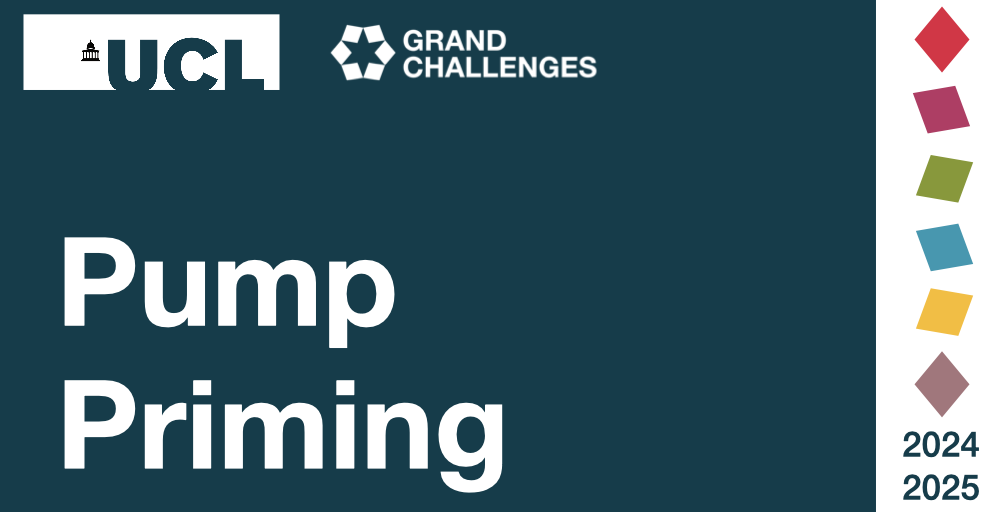Mental Health & Wellbeing Pump-Priming 2024/25 - Call is now closed
Funding of up to £25,000 is now available to support research that crosses disciplinary boundaries and accelerates intervention discovery and development.

26 April 2024
UCL’s Grand Challenge of Mental Health & Wellbeing (GC MHW) welcomes applications for “pump-priming” funding of up to £25,000 per project to support research that crosses disciplinary boundaries and accelerates intervention discovery and development.
The projects funded should represent impactful preliminary work that can lead to the development of a larger, externally funded project. Applications should be aligned with the key focus of GC MHW, which is accelerating intervention discovery or implementation. GC MHW defines intervention as any systematic effort to improve the mental health and/or wellbeing by focusing on individuals, groups of individuals, institutional/organisational structures, or societal/systemic issues.
Conceptual, basic and applied work from different research traditions and disciplines are all critical for supporting more effective ways to promote wellbeing and mental health and are all within the remit of this call. UCL Grand Challenges uses ‘cross-disciplinarity’ to mean collaboration between experts in different fields that cuts across traditional subject areas. We see cross-disciplinary research as the effort to solve problems in an innovative way through the integration of skills and/or approaches from different disciplines.
Applications should involve at least one early career researcher (Doctoral researcher, post-doctoral researcher, or faculty member/fellowship holder within eight years of PhD graduation or six years of their first academic appointment*). We strongly encourage applications from teams working across different UCL Faculties, and particularly welcome applications that focus on groups that are at increased risk of poor mental health.
*These periods exclude any career break, for example, due to:
- family care
- health reasons
- reasons related to COVID-19, such as home schooling or increased teaching load.
Some possible focus areas below, as examples, but any topic within the remit of the GC MHW theme is welcome:
- Social changes and their mechanisms
This includes the study of mechanisms that operate when an individual’s or group’s behaviour changes for the better as a result of changes in social factors. For example, how do we get people to exercise more, what is the mechanism through which we achieve this, and what is the impact on mental health and wellbeing? Social changes, e.g., reducing inequality-related problems and their mechanisms, are also highly relevant here, as is research focusing on social/behavioural change as leverage for biological studies.
- Development of models of mental illness (and wellbeing)
These can be animal models or other instantiations (e.g. organoids, in silico models, models of social influence) that can be used to accelerate interventions and that offer mechanistic insights. Examples could include the genetic screening of druggable targets or the creation of credible animal models of specific symptoms, dysfunctional cognitions, or social and biological processes relevant to mental health (broadly construed). We encourage applicants to consider ethical, philosophical, and legal implications in relation to biological, neuroscientific, and cognitive approaches and to involve colleagues from relevant disciplines in the applications.
- Spaces that support mental health
Projects in this area could address how the built and natural environment and buildings support or hinder mental health or how digital spaces impact on mental wellbeing. Examples could include the impact of time spent in nature, the effects of different types of home or office space, digital engagement, or external urban environments. It will be important to consider design, architectural, geographical, or digital considerations, as well as data from e.g. psychological or neurosciences to understand the interplay between the environment and the individual.
- Funding
Applications for projects/activities costing between £10,000 - £25,000 will be considered under this call. In total, up to 15 projects will be awarded. Funding must be spent by 31 July 2025 – any unspent funds will be returned to UCL Finance at the end of the grant.
Salary costs for research assistant staff are eligible, but contributions towards salary costs for contracted UCL staff members are not. A brief report of all expenditures must be submitted, alongside as an impact report.
- Eligibility
- First applicants must be UCL staff – either researchers in academic Faculties or Professional Services.
- Secondary Applicants can be UCL staff/Doctoral researchers and / or external partners. There is no limit to the number of secondary applicants, and we therefore strongly encourage involvement of more than one UCL department/faculty, as well as consideration of external partners were appropriate. Applications that only involve one UCL department/faculty are extremely unlikely to receive funding and must justify how they meet cross-disciplinary remit of the call.
- The team must comprise at least one early career researcher (Doctoral researcher, post-doctoral researcher, or faculty member/fellowship holder within eight years of PhD graduation or within six years of their first academic appointment).
The deadline for applications is Monday 3 June, 17.00 (GMT).
If you have any questions, or require the form in an alternative format, please email Siobhan Morris (siobhan.morris@ucl.ac.uk).
 Close
Close

